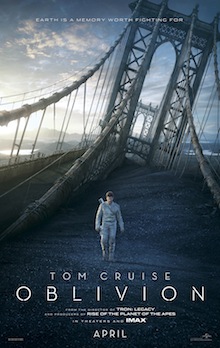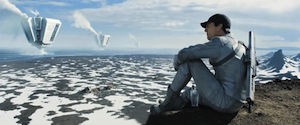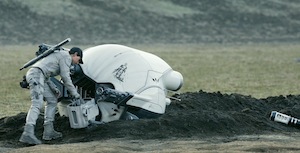 Tom Cruise battles an invisible alien threat on a post-apocalyptic Earth in Oblivion, the latest from talented visual director Joseph Kosinski. The film, which takes place in a distant future where Earth was attacked by an alien force, fought off the attackers, but made the planet uninhabitable in the process. Cruise’s character, Jack, is charged with maintaining a series of drones and protecting power plants from the remaining alien scavengers, called scavs for short.
Tom Cruise battles an invisible alien threat on a post-apocalyptic Earth in Oblivion, the latest from talented visual director Joseph Kosinski. The film, which takes place in a distant future where Earth was attacked by an alien force, fought off the attackers, but made the planet uninhabitable in the process. Cruise’s character, Jack, is charged with maintaining a series of drones and protecting power plants from the remaining alien scavengers, called scavs for short.
It’s an interesting premise, that is quickly marred by familiar Sci-Fi tropes and MacGuffins that plunge the film into terribly predictable and familiar territory. What’s more, Oblivion doesn’t make much sense when considered for even the smallest amount of time. This is particularly frustrating given the number of interesting routes the film could have taken. It asks big questions about fate, memory and human nature and answers them with idiotic quotes like, “If we have a soul, it’s made up of the love we share.” Seriously.
Olga Kurylenko appears as a woman from Jack’s past. She is about as interesting as the film’s many dire sets and backgrounds. It’s baffling that she’s in movies at all, as she has nothing to do here, and no range in which to do it. It doesn’t help matters that her character’s arrival is supposed to be the film’s catalyst, but her performance is more reminiscent of a wet match.
The same can’t be said for Andrea Riseborough. One of the film’s only bright spots, she injects a surprising amount of depth into her character given her small amount of screen time and the material she has to work with. Everything down to her body language is subtle and hints at uncertainty and familiarity in her tasks and actions. A late flashback between her and Cruise’s character is the film’s dramatic high point, but is left essentially moot because of the film’s need to over-explain itself.
Everyone else, here from Cruise to Morgan Freeman to Game of Thrones fan favorite Nikolaj Coster-Waldau are along for the ride. There’s nothing for many of these actors to do, save explain the plot, and in the case of Coster-Waldau, say nothing at all. This wouldn’t be so frustrating, if the film didn’t aspire to be anything other than an action vehicle, but at times it does. And when you consider the chops of the cast, seeing them so limited is a waste of everyone’s time, including the viewer’s.
 The only other bright spot Oblivion has is its compelling visual aesthetic. This includes everything from the art direction to the brilliant cinematography from Oscar-winner Claudio Miranda. The world of Oblivion is fully realized, detailed and amazing. Seeing the film in IMAX is the definite way to go, as it gives even the smallest detail added gravitas. It’s a well composed movie, skillfully shot, edited and assembled, but underneath the polished veneer is a hollow, even empty film that seems compelled to spell out every last detail, in case you suffered a brain injury just before entering the theater.
The only other bright spot Oblivion has is its compelling visual aesthetic. This includes everything from the art direction to the brilliant cinematography from Oscar-winner Claudio Miranda. The world of Oblivion is fully realized, detailed and amazing. Seeing the film in IMAX is the definite way to go, as it gives even the smallest detail added gravitas. It’s a well composed movie, skillfully shot, edited and assembled, but underneath the polished veneer is a hollow, even empty film that seems compelled to spell out every last detail, in case you suffered a brain injury just before entering the theater.
Oblivion proves that Kosinski is a deft visual storyteller, but that his films are only as good as the story they’re based upon. He either needs to start paying closer attention to that or hire other people who will.




Comments on this entry are closed.